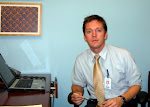Gone - A patient encounter

(Swazi sunset over cane fields, as seen from from Melandelas)
I learned something yesterday. I learned what it feels like to be the last doctor to see child before that child dies.
I hadn’t even picked up my first chart when I saw the family walk in early yesterday morning. Well, it had been a family. Mother, father, baby.
Yesterday morning, no baby.
The father looked up at me and said, “My baby is gone. He’s gone.”
I looked at him puzzled, as if to say “where to?” Indeed, that is what I wanted to know.
The baby had been in mom’s arms in my exam room a mere seven days before. I watched the baby feed vigorously. I treated the baby’s thrush. I complimented the "family" on their hard work, for the child had been born over two months premature, and they had kept him going, against plenty of odds, for his first month of life.
I had been so proud that the child, who desperately needed ARVs, had made it to our clinic, and together we made a plan that I believed would keep the baby alive.
The father saw that I did not understand where the baby had actually gone.
He leaned toward me, and with the soft squeaky voice of one severely burdened spoke one solitary word,
“Funeral.”
There are instants when there is no pride in my work, only humiliation.
I was humiliated. As I relive the instant, I still am.
I fixed my eyes on his, and said, “I am so so sorry.”
The truth was that I knew nothing of sorrow. This man, a week before, had told me he would do anything for his child, his now-dead child. His wife, the mother of the child, has AIDS, and could die any day, even with careful treatment.
I can be as so so sorry as I want to but I know nothing of such pain.
The father must have noticed the void look in my eyes, for he put his hand on my shoulder and said to me,
“It is all ok. It is all with God. God knows.”
I believe that this is what he said, verbatim, with his right hand on my left shoulder.
I paused, then responded as well as I knew how: a hand on his hand, a bowed head, and sorrowful, regretful, hopefully caring expression.
My gestures were appropriate, I suppose, but is was abundantly clear that this man with a dead baby and his hand on my shoulder was actually the one comforting me, and it pained me even more to think how wonderful this man would be as a father—strong, centered, faithful, even affectionate in the most desperate of circumstances.
Yes, if I didn’t know better, I would say that he was destined to be an outstanding father.
I said goodbye to the bereaved parents, walked down the hall, up the stairs, and to the chart room. I took the deceased patient’s chart from the shelf, looked over it, and sought out two other pediatricians to briefly discuss the case with me.
Hindsight combined with the scrutiny of my trusted colleagues suggested that I probably could not have saved the baby.
As I wrote the letters "R.I.P." on the manila folder encasing the patient’s brief medical history, I promised myself this:
Next time (and God knows there will be plenty of next times), I am damn well going to try.
Labels: Patient encounters


1 Comments:
Hey Ryan. Powerful experience, powerfully described. I have a dear friend who works as a doctor and priest in Haiti. He starts each day by washing and blessing the bodies of the children who have died in his hospital overnight. He sings while he does it. Sometimes I really envy him the faith-based services he can offer...but I think even those of us limited to medical care can love the children...those who make it and those who don't....and respect their families. Keep up the good work, with good heart.
Post a Comment
<< Home